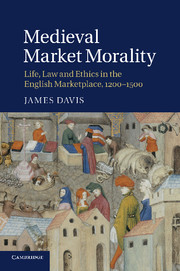4 - An evolving market morality?
Published online by Cambridge University Press: 05 December 2011
Summary
In 1971, E. P. Thompson wrote a seminal article entitled ‘The moral economy of the English crowd in the eighteenth century’, which has spurred historical debate ever since. What made this topic so intriguing was that an ‘old moral economy of provision’, based on the needs of the consumers and control of the market, was juxtaposed against a developing eighteenth-century ‘new political economy of the free market’, which sought to diminish interference and controls. For Thompson, this moral economy was a selective reconstruction of paternalist legislation stretching back to medieval and sixteenth-century England; a holistic moral economy hostile to a Smithian free-market, laissez-faire model. This book has already addressed the complexities involved in unravelling medieval conceptions of a ‘moral economy’. If eighteenth-century attitudes of the ‘crowd’ were embedded in long-held notions of market morality and behaviour, then it is worth reconsidering why they had survived for so long in the face of economic change.
The attitudes of English market users were gradually formed during centuries of commercial and market development. However, attempting to track a definitive chronology of transition from subsistence-based, collective ethics to individualistic, profit-based motivations is not only elusive but problematic in its basic premise. Changes in commercial ethics and market culture were slow and piecemeal, and traditional mores remained important even while new economic attitudes were shaped. The marketplace was an intense and complex arena of cultural negotiation between a variety of forces – ideology, laws, economics, vested interests and social needs. Indeed, we should not create too stark a dichotomy between concepts of a traditional ‘moral economy’ and an emerging ‘market economy’ as though they are diametrically opposed and incompatible. Recourse to moral justifications does not necessarily exclude motivations of self-preservation or profit, while market relations were interpreted in the way they impacted on notions of communal justice. A moral language permeated commercial regulation. As John Stevenson has suggested, ‘if anything like a moral economy can ever be said to have existed, it was remarkably flexible and adaptive to change’.
- Type
- Chapter
- Information
- Medieval Market MoralityLife, Law and Ethics in the English Marketplace, 1200–1500, pp. 410 - 449Publisher: Cambridge University PressPrint publication year: 2011



